|
|
|
Sort Order |
|
|
|
Items / Page
|
|
|
|
|
|
|
| Srl | Item |
| 1 |
ID:
123882
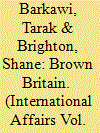

|
|
|
|
|
| Publication |
2013.
|
| Summary/Abstract |
How do we approach the subject of British grand strategy today? This article seeks a new approach to this question. It argues that there is a gap of grand strategic significance between actually-existing Britain and the Britain its political elites tend to imagine.
The colonial and imperial histories that helped constitute and still shape the contemporary United Kingdom have fallen through this gap. One consequence is a grand strategic vision limited to a choice of partner in decline - Europe or the US. Overlooked are the power political potentialities of post-colonial generations situated in multiple sites at home and abroad.
In search of this potential, we lay the conceptual basis for a strategic project in which the British 'island subject' is replaced by a globally networked community of fate: 'Brown Britain'. This entails reimagining the referent object of British strategy through diaspora economies, diverse histories and pluralized systems of agency.
What might such a post-colonial strategy entail for British policy? We offer initial thoughts and reflect on the often occluded social and political theoretic content of strategic thought.
|
|
|
|
|
|
|
|
|
|
|
|
|
|
|
|
| 2 |
ID:
169063
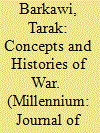

|
|
|
| 3 |
ID:
145673
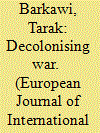

|
|
|
|
|
| Summary/Abstract |
What would it mean to decolonise the concept of war? ‘Decolonising’ means critiquing the ways in which Eurocentric ideas and historiographies have informed the basic categories of social and political thought. Dominant understandings of the concept of war derive from histories and sociologies of nation-state formation in the West. Accordingly, I critique this Eurocentric concept of war from the perspective of Small War in the colonies, that is, from the perspective of different histories and geographies of war and society than were assumed to exist in the West. I do so in order to outline a postcolonial concept of war and to identify some of the principles of inquiry that would inform a postcolonial war studies. These include conceiving force as an ordinary dimension of politics; situating force and war in transnational context, amid international hierarchies; and attending to the co-constitutive character of war and society relations in world politics.
|
|
|
|
|
|
|
|
|
|
|
|
|
|
|
|
| 4 |
ID:
108093
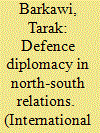

|
|
|
| 5 |
ID:
049638
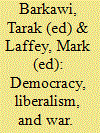

|
|
|
|
|
| Publication |
Boulder, Lynne Rienner Publishers, 2001.
|
| Description |
viii, 237p.
|
| Standard Number |
1555879551
|
|
|
|
|
|
|
|
|
|
|
|
Copies: C:1/I:0,R:0,Q:0
Circulation
| Accession# | Call# | Current Location | Status | Policy | Location |
| 045041 | 327.172/BAR 045041 | Main | On Shelf | General | |
|
|
|
|
| 6 |
ID:
105930
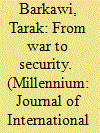

|
|
|
| 7 |
ID:
065342
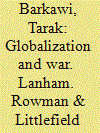

|
|
|
|
|
| Publication |
Lanham, Rowman & Littlefield Publishers, Inc., 2006.
|
| Description |
xviii, 199p.
|
| Series |
Globalization
|
| Standard Number |
0742537013
|
|
|
|
|
|
|
|
|
|
|
|
Copies: C:1/I:0,R:0,Q:0
Circulation
| Accession# | Call# | Current Location | Status | Policy | Location |
| 050061 | 303.66/BAR 050061 | Main | On Shelf | General | |
|
|
|
|
| 8 |
ID:
117765
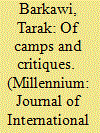

|
|
|
|
|
| Publication |
2012.
|
| Summary/Abstract |
This is a very difficult piece to reply to as it engages so minimally with the substance of my original article, 'From War to Security: Security Studies, the Wider Agenda, and the Fate of the Study of War'. Instead, Claudia Aradau appears most concerned to defend Critical Security Studies from critique. Apparently, among other things, I homogenise Critical Security Studies through 'a technique of ambiguous equivalences'.1 It may come as some surprise to readers of 'Security, War, Violence' that my article hardly mentions Critical Security Studies.2 Rather, I was primarily concerned with traditional security studies, on the one hand, and the 'wider agenda' - the idea that anything can be 'securitised' - on the other. My argument was that, in International Relations (IR), the study of war was largely a casualty of the debate between these two positions. Traditional security studies dealt with strategy not war, while the wider agenda was concerned with the logic of security itself. As a consequence, a discipline that imagines itself as centrally concerned with questions of war and peace does not in fact study war, part of a larger elision of war in the Enlightenment organisation of social and political inquiry. I go on in the article to outline the astounding absence of the Second World War in IR scholarship and then map out some ways in which the critical study of war leads us to think differently about the 'international' as a distinct space for inquiry. I was seeking to outline a 'critical war studies' for IR, to frame and enable a new direction for research.
|
|
|
|
|
|
|
|
|
|
|
|
|
|
|
|
| 9 |
ID:
051441
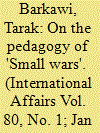

|
|
|
| 10 |
ID:
071469
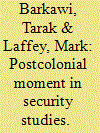

|
|
|
|
|
| Publication |
2006.
|
| Summary/Abstract |
In this article, we critique the Eurocentric character of security studies as it has developed since World War II. The taken-for-granted historical geographies that underpin security studies systematically misrepresent the role of the global South in security relations and lead to a distorted view of Europe and the West in world politics. Understanding security relations, past and present, requires acknowledging the mutual constitution of European and non-European worlds and their joint role in making history. The politics of Eurocentric security studies, those of the powerful, prevent adequate understanding of the nature or legitimacy of the armed resistance of the weak. Through analysis of the explanatory and political problems Eurocentrism generates, this article lays the groundwork for the development of a non-Eurocentric security studies.
|
|
|
|
|
|
|
|
|
|
|
|
|
|
|
|
| 11 |
ID:
106193


|
|
|
|
|
| Publication |
2011.
|
| Summary/Abstract |
This paper approaches the ontology of war by asking why, despite its constitutive function for politics and society, has war never been made the object of an academic discipline? Through an analysis of the relationship between war and knowledge about war, we argue that the ontology of war is such that it disrupts foundational claims of the kind necessary for conventional forms of academic disciplinarity. At the center of the ontology of war is fighting, an idea we recover from Clausewitz. A moment of radical contingency, fighting both compromises knowledge about war and forces the unmaking and remaking of social and political orders. These generative powers of war operate through the production of systems of knowledge and their institutionalization in the academy, the state and wider society. Although of existential significance for political authority, these knowledges are vulnerable to the very contingency of war that produces them. This complex of relations between war, knowledge, and power we term War/Truth. As such, an analytical framework adequate to war requires a reflexive relation to truth claims. We clear the ground for such a "critical war studies."
|
|
|
|
|
|
|
|
|
|
|
|
|
|
|
|
| 12 |
ID:
146163
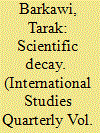

|
|
|
|
|
| Summary/Abstract |
Poznansky (2015) attempts to reconcile democratic-peace theory with US covert operations against elected regimes during the Cold War. In the course of doing so, he exposes both the degenerating character of the democratic-peace research program and its ideological underpinnings in American exceptionalism.
|
|
|
|
|
|
|
|
|
|
|
|
|
|
|
|
| 13 |
ID:
145967
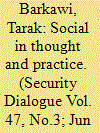

|
|
|
|
|
| Summary/Abstract |
In Economy of Force (2015), Patricia Owens has produced original scholarship of the first order. She recovers the discourse of household rule that has informed modern social thought. Readers of Security Dialogue and those who work in critical security studies will find her work of special interest. International relations scholars have typically turned to social theory as a source of critical insight for leverage in an intellectually and politically conservative discipline. Security Dialogue has been an important forum for such work, where disciplines influenced by social theory, from sociology to political economy, have been brought to bear on questions of security. Owens, by contrast, lays bare the hidden conservative politics behind much social theorizing. For her, social thought seeks to domesticate social disorder.
|
|
|
|
|
|
|
|
|
|
|
|
|
|
|
|
| 14 |
ID:
160395
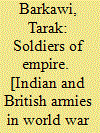

|
|
|
|
|
| Publication |
Cambridge, Cambridge University Press, 2017.
|
| Description |
xvii, 321p.pbk
|
| Standard Number |
9781316620656
|
|
|
|
|
|
|
|
|
|
|
|
Copies: C:1/I:0,R:0,Q:0
Circulation
| Accession# | Call# | Current Location | Status | Policy | Location |
| 059491 | 940.54/BAR 059491 | Main | On Shelf | General | |
|
|
|
|
| 15 |
ID:
131689
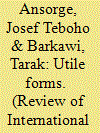

|
|
|
|
|
| Publication |
2014.
|
| Summary/Abstract |
This article introduces the concept of 'utile forms' and analyses the effects of these forms in imperial rule and contemporary counterinsurgency. Utile forms are media that enable bureaucracies to disseminate specialised knowledges to officials operating in the field. Examples include smart cards, field manuals, and handheld biometric devices. We argue that utile forms have significant social and political effects irrespective of the 'truth value' of the knowledge they contain. We analyse these effects in terms of world-ordering and world-making properties: utile forms both embody a particular worldview or ideology (world-ordering) and they facilitate official attempts to remake the world in accordance with this vision (world-making). We draw on examples of utile forms from British India and more recent conflicts in Iraq and Afghanistan. The article concludes by reflecting on the relations between truth, knowledge, and power in times of war and imperialism.
|
|
|
|
|
|
|
|
|
|
|
|
|
|
|
|
|
|
|
|
|